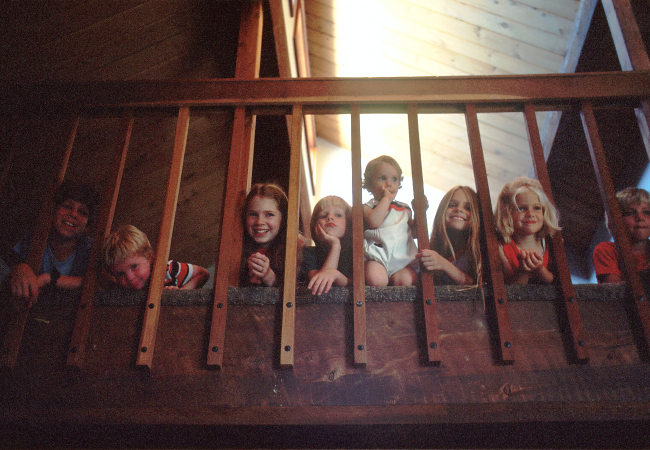How to Become an Au Pair in Paris


Do you enjoy looking after children? Do you want to live in a new country? And are you aged between 18-30? Consider an au pair program: it’s a wonderful way to explore a new place, make life-long friends, and learn a new language. By sharing everyday life with a family, you immerse yourself in the local culture. Accommodation is provided, as is food, and you also get paid pocket money for expenses, all while living in the most incredible locations.
Why Au Pair In Paris?
Upon graduating from university in summer 2022, I began searching for my next big adventure. I didn’t take a gap year before beginning university, so I knew that I wanted a gap year (or two!) after my studies to travel, explore, and spend time doing the things I really love. I found that during my final year at university, I had not given any time to my extra-curricular passions, and so I wanted a situation where I could again absorb myself in my hobbies: art, travel, learning languages, concert-going, cooking… the list goes on.
I have always loved France, and Paris in particular, and I have very fond memories of family holidays spent here. After deciding that I wanted to move to Paris for a year, I researched ways in which I could do just that. The Google search result that kept recurring: Aupairworld.com. I have been a babysitter since I was 16, and I’ve also worked in a nursery and as a tutor for children of all ages, so I knew that this was the perfect route.
Rich in culture and history, Paris is an incredible location to be an au pair. Whatever you enjoy most, whether that be food, fashion, art, history, or adventure, there will always be something for you to do. Beyond its obvious charms, Paris is also well situated to explore the rest of Europe, and it’s well connected by train to other cities: 1 hour and 20 minutes to reach Brussels, 2 hours and 10 minutes to access London, and 3 hours to reach Amsterdam, with trains also going to Barcelona, Berlin, Milan, and many other destinations.

Paris is well connected by train to other cities. Photo by Siebe Warmoeskerken on Unsplash
What Does an Au Pair Do?
French legislation rules that EU au pairs must work no more than 30 hours per week, babysitting included, and non-EU au pairs must work no more than 25 hours per week, babysitting included. Hence, the average au pair will tend to work four hours a day, Monday through Friday, leaving enough hours to equate to one night of babysitting per week.
Personally, I look after two young children and I am required to work Monday to Friday from 4.30 p.m. to 8 p.m. Children in France do not have school on Wednesdays, so on Wednesdays I take them to their extracurricular activities at midday. Three days a week, I arrive at the family’s home an hour earlier to prepare dinner which is something I really enjoy.
The day-to-day schedule is different for each au pair as all family situations are unique and depend on factors such as the age and number of the children.
If your schedule requires you to work in the morning, this means simply that you drop the children at school at 8:30 a.m. At 4:30 p.m., au pairs manage school pick-up and either take the kids to an afterschool activity, to a park, or back to their house. Then you usually help the children with their homework, give them a bath, and entertain them until the parents/guardians get back from work. Some schedules require the au pair to also cook the dinner. Au pairs will then have dinner with the family before being let off. The typical schedule calls for one night of babysitting per week.
This schedule means that the typical au pair is able to enjoy free time for the majority of the morning and early afternoon which affords the opportunity to experience living in a new city. Many au pairs use this time to attend language classes, explore museums, meet up with new friends, join new sports teams, take part in creative courses, or simply relax and enjoy a slower pace of life.

Au pairs manage school pick-up and either take the kids to an afterschool activity, to a park, or back to their house. Photo by Shalev Cohen on Unsplash
How Do You Find a Host Family?
My most important piece of advice: know exactly what you want from the au pair experience, and keep searching until you find a family that meets your requirements. In this situation, it is good to be picky. If you want your own space, you can find a family who will provide separate accommodation. If you can’t speak French, you can find a family who prefers you speak English. If you love to sleep in each morning, you can find a family that only requires help in the afternoons.
After spending three years of independent living at university, I knew that I wanted a family that provided separate accommodation for the au pair. I also partake in French language classes two mornings a week, so I only wanted to work afternoons. The amazing thing about the au pair program is the freedom and flexibility it can give you, provided the family is the right fit.
It is easy to get over-excited during the application process, but this may lead you to rush into signing a contract with a family that doesn’t match your needs. If you end up with a schedule that is not what you had envisioned, the au pair experience becomes a lot less glamorous. But fear not, if there is an issue with your host family you are not locked in. Fortunately, an au pair contract can be terminated at any point.
There are three routes for finding a host family. The most popular route is AuPairWorld. Extremely simple to use, AuPairWorld is a free website in which you create an au pair profile and search for your ideal host family. This is the process by which I, and the majority of my au pair friends, found our families and achieved great outcomes. A benefit of AuPairWord is that while it is free for au pairs, host families pay a fee to have their profile appear on AuPairWorld to ensure that they actively put time, effort, and money into finding a suitable au pair. The team at AuPairWorld also provide constant support during the process, so you never feel alone. As this is the most popular route, there is a lot of “competition” from other au pairs. Yet, there are a lot of families too, so you will always be wanted.
View this post on Instagram
The second route is the use of au pair agencies. Parisian au pair agencies such as Au Pair Butrfly or Cultural Care Au Pair Paris provide a few added perks. Agencies charge a fee, and this fee goes towards constant support, help with your paperwork and visa (if needed), and the agency itself matches you with a suitable family from their records. Those that choose this route appreciate the guiding hand through what can be a difficult process. However, for all European countries (apart from The Netherlands and Switzerland), there is no obligation to become an au pair through an agency, and agencies have some downfalls. The matching process can take many months compared to the swiftness of AuPairWorld, and agencies can seem restrictive. Agencies take away the freedom of choosing your own family, and if the family ends up not working out, most au pair agencies require permission for you to leave a family which can make you feel trapped.
The final route is the use of Facebook groups such as Au Pair PARIS, Au Pair in France, or Au Pair in Paris, to name a few. Host families post information about their situation and schedule, and you can send direct messages to them. Nevertheless, this route arguably provides no support if you need help during the process, or once you arrive in Paris.
View this post on Instagram
Central Paris or the Suburbs?
An au pair contract can be as long as two years, but as I am only able to stay in Paris for one year, I knew that I wanted to live in central Paris to make every second count. Living in the city center provides you with the complete Parisian experience. You can wake up and walk to your local boulangerie for breakfast, stroll along the Seine before having lunch at a classic bistrot, explore a museum and then grab a coffee at a cafe. What’s not to love? Central Paris is very well connected meaning that almost everywhere is a maximum of 30 minutes away by metro. This allows you the freedom to explore all that Paris has to offer.
On the other hand, living in central Paris can feel overwhelming at times. There is a lot of noise, a lot of people, and a lot less space. Generally, the cost of living is higher in central Paris, so it may be more expensive to go out for a coffee, a meal or a drink.

The entry to the Métro station of Grands Boulevards on Boulevard Montmartre. Photo credit: Paris II by Chabe01/ Wikipedia Commons
Living in the suburbs provides peace and calm that may not be easy to find when living in the city center. In general, the suburbs are quieter, greener and more authentically “French.” After a busy day spent in the noise of the city, it can be nice to return to the suburbs. Typically, host families in the suburbs live in larger houses/apartments, which means that you will have more living space. Paris and the Île-de-France region is well connected through public transportation, which means it is accessible to reach central Paris directly from most suburbs.
However, depending on how far outside of Paris you are, it can still take between 20 minutes to 1.5 hours to get into central Paris. This means that it takes longer to get to know your way around Paris and to develop a familiarity with the city. Living in the suburbs is also difficult when you want a late night in Paris, as regular public transport usually stops at 1 a.m.

Living in the suburbs is also difficult when you want a late night in Paris, as regular public transport usually stops at 1 a.m. Photo by Mario Scheibl on Unsplash
To Live in, or not to Live in? That is the Question.
There are two types of au pairs: live-in au pairs, and live-out au pairs. As the name suggests, live-in au pairs are provided with a bedroom within the host family’s house, and live-out au pairs are provided with separate accommodation, whether that be in the host family’s building, or in a separate building. There are pros and cons to both living arrangements, and there is a lot to take into consideration when it comes to choosing the ideal situation for you.
For live-in au pairs, you get a real taste of what it means to be “French,” whether this be through the food you eat, films you watch or games you play. Living with a host family is the truest form of cultural immersion and in turn, it is easier and quicker to learn the language as you are constantly surrounded by it. Another benefit of being a live-in au pair is that it is easier to form a close relationship with both the children and the parents. As a live-in au pair, you are with the children a lot more than you would be as a live-out au pair. Thus, having continual interaction and integration with the family fosters more familiar relationships. This in turn makes it easier to work with the children, as they will see you as more of a friend rather than a babysitter. Living with the family is also beneficial for your bank account. You do not get paid a lot as an au pair, so being a live-in au pair cuts down your living costs as you won’t have to pay for groceries. Another benefit is the opportunity to travel. This point will differ between families, but often, if the family goes on holiday, you will be invited along as well. Families emphasize that you are not viewed as an employee but rather as an extra member to the family. Thus, you will be treated as such.
However, there are some down sides to being a live-in au pair. Although a good host family will respect your privacy, sometimes it may seem difficult to get time to yourself. When living with the family, it can be hard to differentiate between working hours and free time. This blur can make it seem as if you are working more than your required 25 hours a week. But, this issue can be addressed early on if clear boundaries are set in place. If your host family has younger children, an additional disadvantage to being a live-in au pair can be a lack of sleep. If the young children cry during the night or in the mornings, it can erode into your leisure time. In addition, since you don’t want to disturb the family, you may feel a sense of guilt if you come home late at night after an evening with friends.

Sometimes it may seem difficult to get time to yourself. Photo: Unsplash
Live-out positions, such as mine, avoid these situations entirely. Living away from the family provides a very clear distinction between working hours and free time as you will only be around the children for the defined 25 hours per week. As a result, live-out au pair positions provide more independence and freedom. Spending less time with the family does not mean you miss out on all of the local culture. Live-out au pairs will still eat dinners with the family during the week, and those that work mornings will also eat breakfasts with the family.
Nonetheless, live-out positions lose many of the advantages of live-in positions. Though it is the more independent option, this can go to the extreme and foster feelings of loneliness – especially since you are living in a new country. In addition, it takes longer to pick up on the language and to integrate into the family. Although live-out au pairs in Paris are indeed given their own apartment, it’s often a small “chambre de bonne”), with the average size of around 12m2. Furthermore, many chambres de bonne have shared toilets. Live-out au pairs are also required to factor in money for groceries, but luckily, most families will pay you slightly more to account for this.
My top tip for those deciding between a live-in or live-out situation is to make sure you ask for a video tour of the accommodation before finalizing the contract. Sometimes, a large ensuite bedroom in a separate wing of the host family’s apartment may provide more independence than a chambre de bonne with shared toilets!
What is the Going Rate for Au Pairs?
The minimum pay for au pairs is €80 per week, with the average pay being €100 per week. Some families will provide extras on top of this base rate, such as your Navigo pass for the metro, language classes or phone plan; however some will not. This is an important point to take into consideration.
How Do You Find Friends as an Au Pair?
When I decided to become an au pair in Paris, my biggest fear was that I wouldn’t be able to find and make friends. I came to Paris not knowing anyone, so I was eager to find some new friends that I could experience the city with. In spite of this apprehension, finding friends was surprisingly easy. I found the majority of my friends through Facebook groups made specifically for au pairs living in Paris. Group picnics were arranged in which dozens of people would meet, bring along some food, and get to know one another. Another way I met some of my friends was through the app Bumble BFF – a “dating app” – but for finding friends instead of relationships.
Bref: Is it Worth It?
Becoming an au pair allows you to not only learn a lot about a new culture, but it also allows you to learn a lot about yourself. Moving to a new country and adopting a different way of life will be a challenge, but it will be one that you will thank yourself for. You will meet new friends from all around the world, you will become part of a new family, and you will gain amazing memories to last a lifetime. I am only four months into my year as an au pair, and I can already tell that it won’t be enough to experience everything that Paris has to offer.
Lead photo credit : Photo by Léonard Cotte on Unsplash
More in au pair, family, French culture, friends, learning French



REPLY